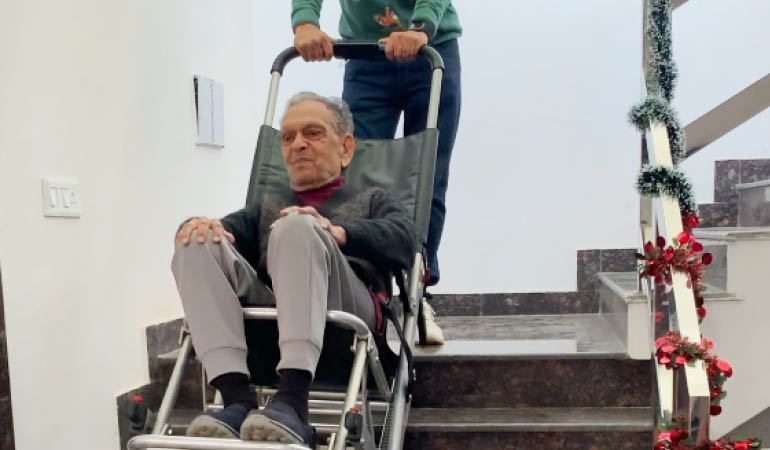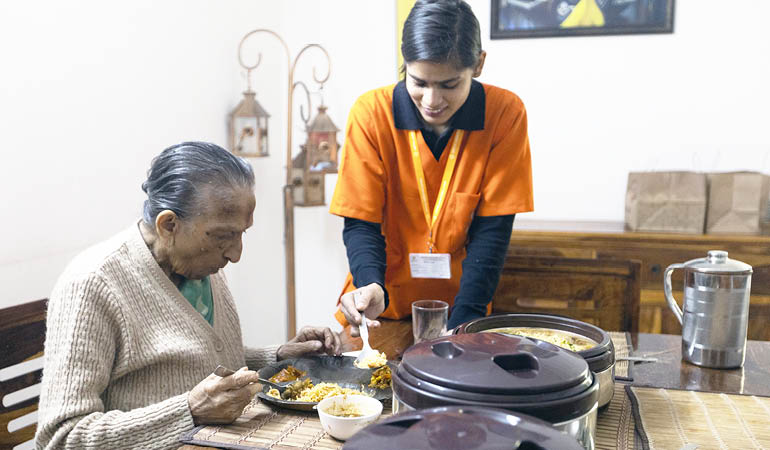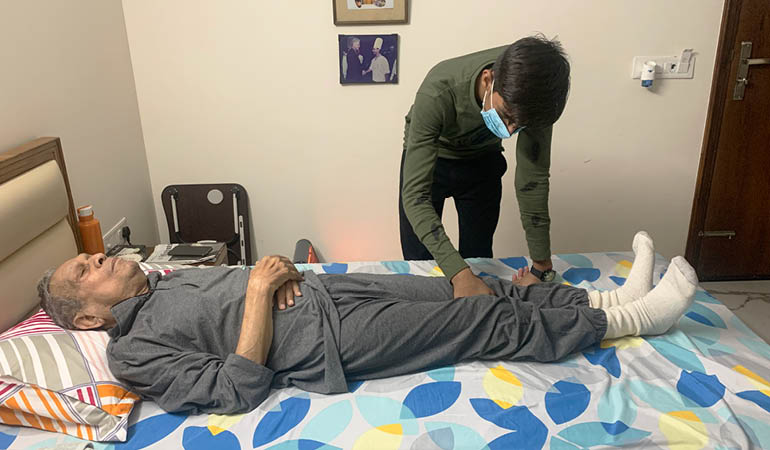Doctor Visits
One of the most noticeable and essential features at Artha Assisted Living elderly home is the doctors’ visits and regular health check-ups for the elderly. This service is not charged extra. Doctors’ visit at the Artha is a comprehensive care service for the good health and wellbeing of the elderly, all under one roof, at the Artha Assisted Living home premises.
Artha Assisted Living’s Doctors’ visits positively impact the elderly health. It enables health maintenance. Doctor visits allow for regular health checks, which provides a way to periodically monitor the elderly' status. If any health discrepancy is found, the doctor is able to further expedite personalised medical care and action. The doctor can check the medical records of the elderly during these visits, which can also help to uncover any health problems.
Doctor visits are very assuring not only for the elderly but also for Artha’s caregivers, nurses and team to contribute to the overall wellbeing of the elderly. At Artha Assisted Living home premises, the visiting doctors care among the best in the medical fraternity.
Get assured with a Doctor on call, periodic doctor visits and an Ambulance on call. Reputed hospitals are just 5-10 minutes away from Artha.



FAQs
A doctor in a senior care home plays a crucial role in monitoring the health and well-being of elderly residents. They conduct regular health check-ups, assess chronic conditions, and manage medications. Their involvement ensures early detection of potential health issues, allowing for timely intervention and treatment. Doctors in senior care homes often work closely with caregivers and nurses to provide a comprehensive care plan that supports older people's physical and mental health. Regular doctor visits help improve the quality of life and ensure that residents receive the medical attention they need in a comfortable environment.
Doctor monitoring health in senior care homes ensures continuous observation of each resident's well-being. Regular monitoring allows doctors to track vital signs, manage chronic illnesses like diabetes or hypertension, and adjust treatment plans accordingly. This constant supervision helps in the early detection of any health deterioration, reducing the risk of complications. Seniors benefit from consistent medical care tailored to their specific needs, improving their quality of life. Additionally, doctors in senior care homes collaborate with caregivers to ensure daily health requirements are met, promoting overall wellness and comfort.
Health monitoring at nursing homes is essential because it helps detect early signs of illness or deterioration among elderly residents. Regular health checks, conducted by trained professionals, ensure that chronic conditions are managed, and any sudden changes in health are addressed promptly. This continuous care reduces hospital visits, improves overall health outcomes, and provides peace of mind to residents and their families. In a senior care setting, health monitoring also involves tracking medications, nutrition, and mobility, which are key factors in maintaining the physical and mental well-being of elderly individuals.
Regular doctor visits at senior homes offer numerous benefits, including early detection of potential health issues, ongoing management of chronic conditions, and timely medical intervention. These visits provide seniors with routine check-ups that assess their overall health, monitor vital signs, and adjust medications as needed. Having a readily available doctor also ensures that sudden health concerns can be addressed quickly. In addition to medical care, regular doctor visits provide emotional reassurance to seniors, knowing that their health is consistently monitored and cared for by professionals within their living environment.
Geriatric care focuses on the medical and healthcare needs of elderly individuals, ensuring they receive specialised care for age-related health issues. In nursing homes, senior care is crucial as it addresses the unique health challenges faced by seniors, such as mobility issues, chronic diseases, cognitive decline, and frailty. A geriatrician at a nursing home provides personalised healthcare plans that cater to these specific needs, ensuring that seniors receive the appropriate level of care. This type of care enhances the quality of life, promotes independence, and reduces the risk of complications from chronic illnesses.
A geriatrician is a doctor who specialises in the care of elderly patients, focusing on the unique health issues related to ageing. Unlike regular doctors, geriatricians are trained to manage multiple chronic conditions, cognitive disorders, and the overall health decline that can come with age. In senior care homes, geriatricians provide tailored medical care that addresses physical and mental health challenges, ensuring comprehensive care for elderly residents. Their expertise in managing age-related issues helps improve seniors' quality of life, making them essential for effective elderly healthcare in nursing homes.
A geriatrician at a nursing home provides specialised medical care designed to meet the unique health needs of elderly residents. This includes managing chronic conditions such as heart disease, diabetes, and arthritis, as well as addressing cognitive issues like dementia or Alzheimer's. Geriatricians also focus on preventive care, conducting regular health assessments to detect early signs of illness. They work closely with caregivers and other healthcare providers to create personalised care plans that improve seniors' overall health and well-being. Their approach is holistic, considering physical and mental health in their treatment.
The frequency of doctor visits at senior homes can vary depending on each resident's health needs. Generally, doctors visit senior homes for regular health check-ups every few weeks or monthly to monitor ongoing health conditions and adjust treatment plans if necessary. Doctor visits may be more frequent for chronic illnesses or complex health needs. Emergency visits are also arranged whenever a resident shows signs of acute infection. Regular visits ensure that seniors' health is continuously monitored and any medical concerns are addressed promptly, preventing the escalation of health issues.
Health monitoring in senior care homes involves several key components, including regular health assessments, medication management, and monitoring of vital signs such as blood pressure, heart rate, and blood sugar levels. It also includes tracking mobility, mental health, and cognitive abilities to ensure residents remain healthy and active. Doctors and caregivers collaborate to maintain detailed medical records and adjust care plans as needed. In some homes, advanced technologies like wearable devices or video monitoring for elderly living independently provide continuous health updates, ensuring seniors receive timely medical care.
Health monitoring improves the quality of life for seniors by ensuring that their physical and mental health are closely tracked, allowing for early detection of any health issues. Regular check-ups and medical supervision allow seniors to manage chronic conditions more effectively and maintain their independence longer. Continuous health monitoring reduces the risk of medical emergencies and hospitalisations, providing a safer living environment. Additionally, it offers peace of mind to families, knowing their loved ones receive consistent care from professionals. This ongoing attention to health helps seniors enjoy a better quality of life with fewer health complications.
.svg)
